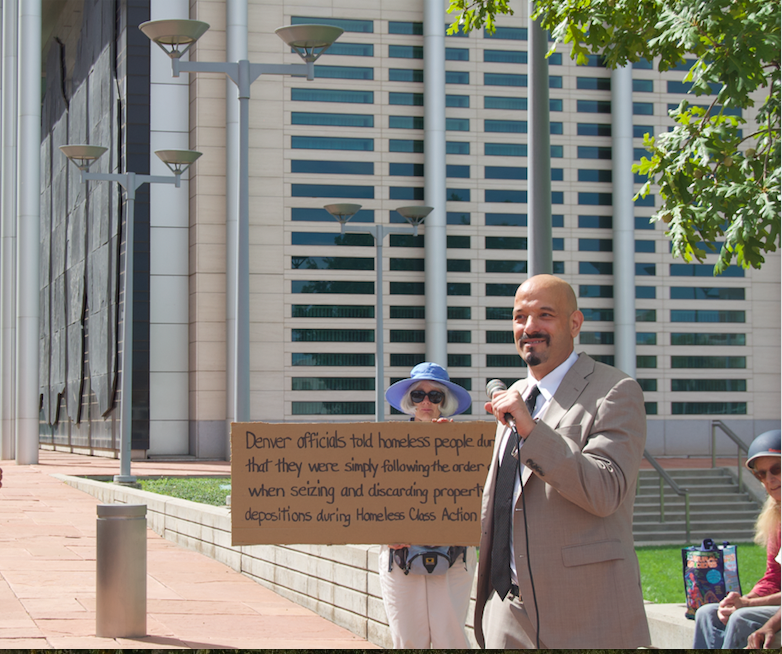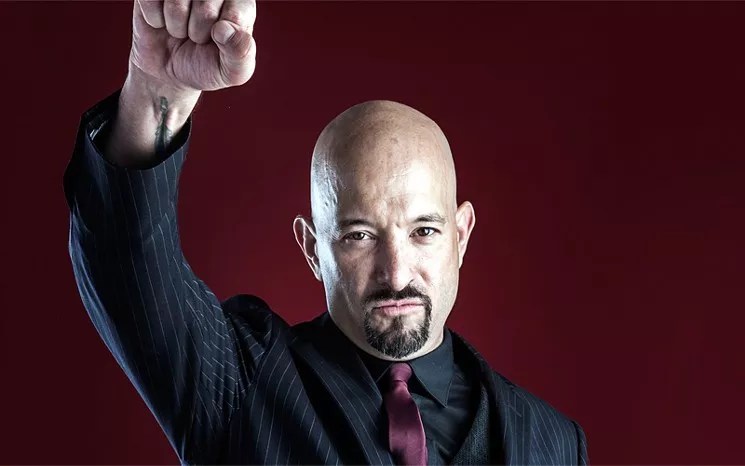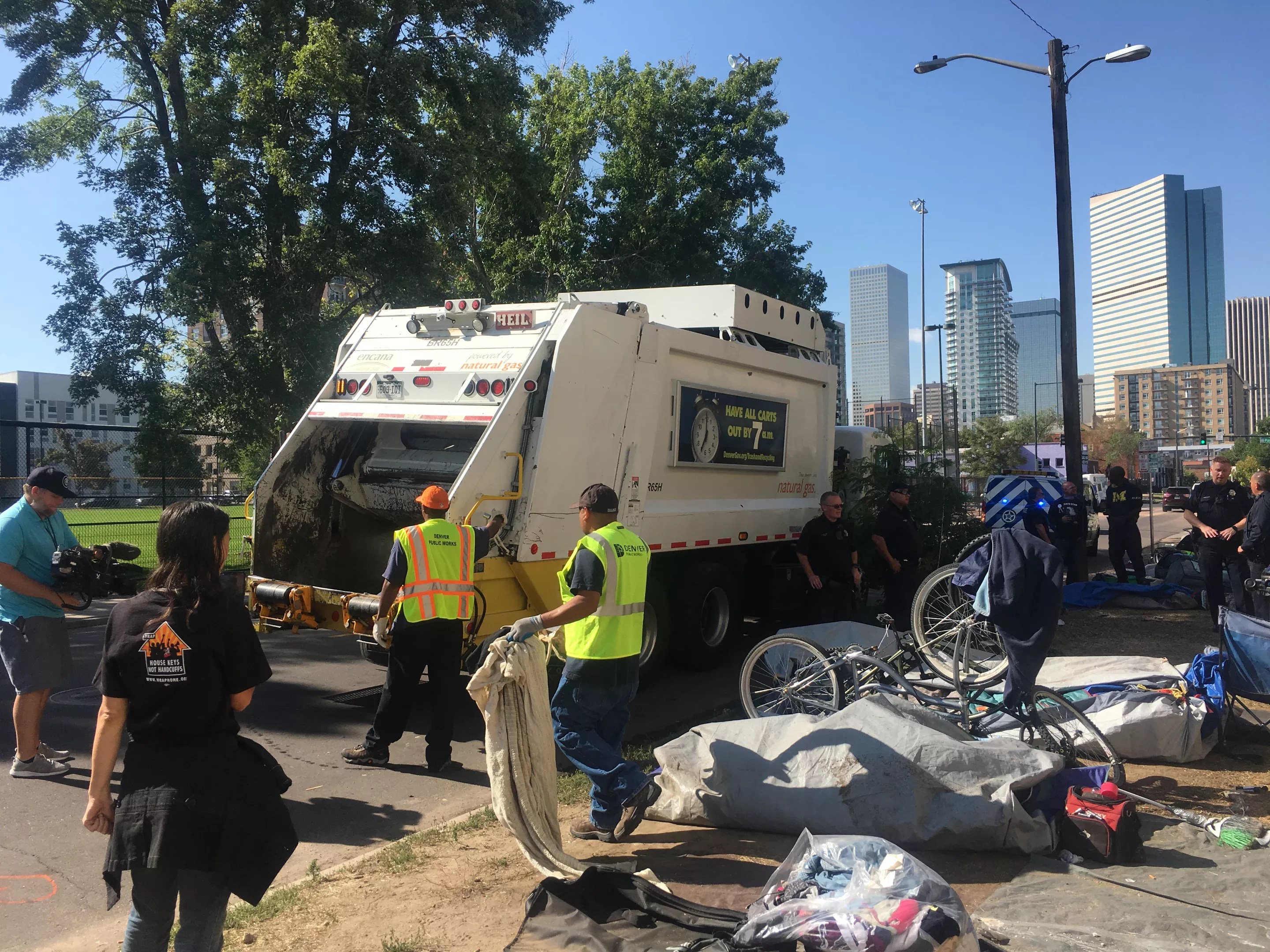
Sara Fleming

Audio By Carbonatix
Four years ago, in the summer of 2016, an eccentric lawyer named Jason Flores-Williams had just moved to an apartment across from Confluence Park, which was then a hub for people experiencing homelessness. “I make friends with everybody,” Flores-Williams says, “so I just began talking with people. I’d maybe take them some food or something.” Soon, though, he started noticing that many of his new friends would be there one day and gone the next.
The City of Denver was cracking down on homeless encampments, Flores-Williams says, increasingly “sweeping” them in the middle of the night, taking people’s meager shelter from the elements, and constantly threatening to move them.
So Flores-Williams took it upon himself to file a lawsuit in federal court: Lyall et al. v. Denver. On Monday, September 23, Flores-Williams stood before a group of unhoused people and their advocates in front of the federal courthouse, where U.S. District Judge William Martinez was about to approve a landmark settlement between the city and Denver’s homeless population. The settlement, Flores-Williams told the crowd, represented “the assertion of the human spirit in the face of a cold and dead world.”
For all the hype it’s gotten over the years, the lawsuit doesn’t undo the city’s urban camping ban. But the settlement caps years of highly unusual litigation that drew the attention of lawyers and media outlets around the country, and became part of a local movement that amplified protests and demonstrations in favor of the dignity of unhoused people.
The opening statement of Flores-Williams’s original complaint marked it as a firebrand, gonzo-style lawsuit. The City of Denver, it alleged, “engaged in a systemic evisceration of thousands of displaced persons’ constitutional rights in order to clear the way for new housing and economic development in the Downtown Denver area,” especially since the urban camping ban was implemented in 2012. “While gentrification may have positive benefits for a few, it is not a legal basis for treating this vulnerable class as though their civil rights were non-existent.”
More specifically, the lawsuit was about property rights and due process. It challenged the city’s practice of taking and sometimes destroying homeless people’s property during sweeps (enforcement actions where police push an encampment out from an area), cleanups (enforcement actions in which the Department of Public Works clears the right-of-way of encumbrances), and day-to-day enforcement of the camping ban or health and safety violations. Homeless plaintiffs who testified described leaving their space temporarily, only to find their tent and sleeping bag gone after a cleanup in the dead of winter; they also said city officials seized their property while threatening arrests.
“If what was happening to homeless people was happening to corporations or homes, it would be a crisis,” Flores-Williams explains. “But because it was happening to the poor and dispossessed, they didn’t give a shit.”
He says he sought class-action status from the beginning as a way to gain some leverage against the city. With the help of the grassroots advocacy organization Denver Homeless Out Loud, he reached out to hundreds of unhoused folks around the city.
“I had some of the best conversations in my life. I got to know people who had a very interesting and compelling outlook on America and what justice is,” Flores-Williams says. “I personally got inspired. I saw the complexities of these peoples’ lives, their desperation, their want to be seen as human beings.”
He found eight representative plaintiffs (that number eventually dwindled to six), all men experiencing homelessness whose property had been seized by the city. But the case still faced a hard fight, especially because it was being brought by Flores-Williams’s small law office with a background in what he calls “fancy criminal defense.” At one point, Judge Martinez told Flores-Williams that he needed to find co-counsel; while the judge said he admired his dedication, he was worried that the attorney’s eccentric style and his tendency to “lean on rhetoric intended to shame the opposing party” was doing more harm than good.

Attorney Jason Flores-Williams represented Aspen Walkingstick.
Anthony Camera
Flores-Williams says that his style – involving flamboyant, impassioned speeches and occasional moral, rather than legal, arguments – grounded the lawsuit in the grassroots. “If I was going to be [the unhoused people’s] lawyer, then they had to have access to me. This litigation could never come from the top down; it always had to go from the bottom up,” he says. Before he would file a motion, Flores-Williams would spend a day telling people on the streets about it, getting their feedback and “incorporating, literally, their words and language into the motion that I would be submitting to federal court.”
When he was daunted by the massive amount of work he had to do himself, Flores-Williams even invited some of his homeless friends to crash at his apartment and help him sort through documents. At nearly every hearing, unhoused people packed the courtroom – a surprising feat considering that many are transient, don’t have identification, or simply don’t trust the system because of past negative experiences.
When Martinez granted the lawsuit class-action status in mid-2017, it caused a stir in the legal world, and suddenly Flores-Williams says he was fielding calls from law firms across the country that wanted to get involved. He eventually took on Andy McNulty of Killmer, Lane & Newman, a firm that had briefly been involved in the case.
After several years of work, it looked like the case was going to end in a “monster” jury trial, Flores-Williams says. But just a month before the trial was set to begin, the parties announced that they had agreed on a settlement.
The settlement awards $5,000 to each of the plaintiffs and spells out a process that the city is to follow before confiscating any property that doesn’t pose a health or safety hazard, including posting a notice seven days before a large-scale cleanup or sweep and individual notices on apparently abandoned property 48 hours before taking it. The settlement also asks the city to provide certain resources that homeless advocates have long been asking for, such as storage lockers, trash cans, portable toilets and needle dispensaries.
The city will also stop using inmates on work release from the county jail to assist Public Works in the cleanups, a practice that Flores-Williams argued in his first complaint constituted “using poor people against poor people…those caught in mass incarceration to destroy the property of the destitute.”
The settlement also requires the city to set up a committee of people experiencing homelessness to advise its follow-through practices. Anyone is invited to participate in these meetings, which will be held every three months. They’ll be professionally facilitated and attended by at least one representative from the mayor’s office and one from the Department of Housing Stability. All city departments that make frequent contact with homeless people will be required to undergo annual “sensitivity training.”
As Assistant City Attorney Wendy Shea said at the final hearing, the settlement was born out of almost-daily phone calls between the city, plaintiff’s attorneys and Denver Homeless Out Loud.
“When I started this out, I viewed the city as evil, and us in a righteous fight,” Flores-Williams says. “But over time, in working with the city, I think they learned about what was going on in the streets and I learned about the challenges they face. They came to see their policies weren’t good and that they could do better, and that they needed to put on the brakes during the time of a rapidly growing city and say, ‘We’re forgetting about the most vulnerable people among us in the name of making a buck.'”
The city might not quite put it that way – it never formally admitted to violating constitutional rights. But the lawsuit has helped bring homelessness to light as a real issue in the city. “I don’t think there’s any question here that everybody in this case is concerned about the well-being of people who are experiencing homelessness,” Shea said.
Still, advocates say they worry that the settlement terms won’t be properly enforced, or won’t have the real-world impact they were hoping for. Denver Homeless Out Loud and Flores-Williams sent out fliers and conducted “Know Your Rights” trainings over the summer to raise awareness of the rights that the lawsuit outlines for
people on the streets.

City officials cleaned up trash, but did not confiscate personal items, while police enforced the camping ban at 24th and California on September 11.
Sara Fleming
The Denver Police Department’s enforcement of the camping ban will remain virtually unchanged, since the settlement focuses on property, which is the jurisdiction of Denver Public Works. Nancy Kuhn, a spokesperson for Public Works, wrote in a statement to Westword, “Large-scale encumbrance removals have been, and as part of the Settlement Agreement, will continue to be, coordinated multi-agency cleanups of a specific, designated area.” That means police will still show up to “keep the peace,” and they still claim the authority to enforce the camping ban and ask people to move along without giving advance notice. As Sergeant Brian Conover told Westword during a cleanup near Lawson Park weeks before the settlement was finalized, “We are not doing any seven-day stuff, we are not doing any 48-hour stuff. We are enforcing the camping ban violation, that’s it.”
“This settlement makes [life on the streets] a little less stressful, because you know that if they follow the agreement and give you notice, then you can actually go to your job and come back and your property won’t be taken,” Terese Howard told members of Denver City Council at a public comment session the week before the final hearing. But police can still enforce the camping ban at any time and move people along, she continued, and “that moving process is extremely stressful regardless.”
Flores-Williams thinks the settlement will have a positive ripple effect. He says civil-rights lawyers and law students in other cities call him weekly to ask how he did it. But he claims he’s also been “inundated with threatening phone calls” from various people who, as he puts it, “somehow have the time to call me about fourteen times in one day and tell me about working hard.”
Others have been upset that their tax dollars are going to his and McNulty’s attorney fees, which total half a million dollars (a relatively small payout for a class-action lawsuit of this scope and length). “If you’re bummed out by the fact that a micro-percentage of the taxpayer dollar has gone to defending constitutional rights, then I question your Americanism and your patriotism,” Flores-Williams says.
Continuing the fight, McNulty has filed a challenge to the constitutionality of the urban camping ban itself. In defense of Jerry Burton, who was ticketed this spring for violating the ban, McNulty is arguing that the law violates the Fourteenth Amendment’s equal-protection clause by specifically targeting homeless people. Burton’s hearing date is set for Friday, October 11.